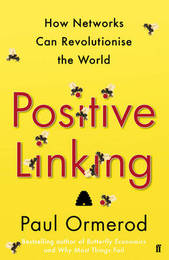
|
Positive Linking: How Networks Can Revolutionise the World
Paperback / softback
Main Details
| Title |
Positive Linking: How Networks Can Revolutionise the World
|
| Authors and Contributors |
By (author) Paul Ormerod
|
| Physical Properties |
| Format:Paperback / softback | | Pages:320 | | Dimensions(mm): Height 234,Width 153 |
|
| Category/Genre | Economic theory and philosophy |
|---|
| ISBN/Barcode |
9780571279203
|
| Classifications | Dewey:330.01 |
|---|
| Audience | | Tertiary Education (US: College) | | Professional & Vocational | |
|---|
| Edition |
Main
|
|
Publishing Details |
| Publisher |
Faber & Faber
|
| Imprint |
Faber & Faber
|
| Publication Date |
5 July 2012 |
| Publication Country |
United Kingdom
|
Description
According to Paul Ormerod, author of the bestselling Butterfly Economics and Why Most Things Fail, the mechanistic viewpoint of conventional economics is drastically limited - because it cannot comprehend the vital nature of networks. As our societies become ever more dynamic and intertwined, network effects on every level are increasingly profound. Our social and economic worlds have been revolutionised by a massive increase in our awareness of the choices, decisions, behaviours and opinions of other people. For the first time in human history, more than half of us live in cities, and this, combined with the Internet, has transformed communications. Network effects - the fact that a person can and often does decide to change his or her behaviour simply on the basis of copying what others do - pervade the modern world. As Ormerod shows, network effects make conventional approaches to policy, whether in the public or corporate sectors, much more likely to fail. But they open up the possibility of truly 'Positive Linking' - of more subtle, effective and successful policies, ones which harness our knowledge of network effects and how they work in practice.
Author Biography
Paul Ormerod was for several years Head of the Economic Assessment Unit at The Economist. He was Director of Economics at the Henley Centre for Forecasting from 1982 to 1992, and has been a visiting Professor of Economics at London and Manchester. He has published widely in academic journals, lectures around the world, and is currently a director of Volterra Consulting. He is the author of Butterfly Economics and The Death of Economics.
|